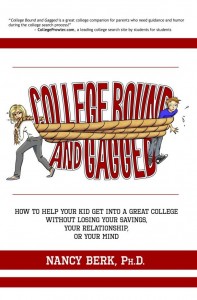I know text speak is not appropriate blogging title content, but there really is no other way to describe the experience I had reading Dr. Nancy Berk’s book, College Bound and Gagged. Nancy takes the everyday aspects of the college admissions process and puts them into terms that parents can easily understand and relate to by using humor. And if that’s not enough, she sprinkles some of the best college admissions advice along the way by tapping into her own personal experiences and her network of college experts that she utilizes throughout the book.
What did I LOVE about Nancy’s book? She allowed the reader to go inside her own college admissions process with her son and experience all the trepidation and angst that goes along with it. She adds humor by describing parent archetypes so you can avoid those types of behaviors during the process. Her “5 Tips” sprinkled throughout the book simplify each step in the process and her “Top Tips” from college experts put you inside the heads of those who are “in the know” about college admissions.
Quite honestly, every page of her book had me laughing and saying, “Man oh man, do I remember that statement coming out of my daughter’s mouth!” Then Nancy helps you put it all into perspective and get you to the other side of the drama giving you insight into the perfect mental and emotional response.
Here’s an excerpt from her book of a conversation between Nancy (denoted as “me”) and her son (denoted as “teen”) related to college selection:
Me: What about Texas?
Teen: I don’t think I can go anywhere where they speak with southern accents.
Me: But you have a Pittsburgh accent. This really isn’t the place to start throwing stones.
Me: (after deep breath) What about Ohio? There are so many great schools in Ohio.
Teen: I’m not going anywhere that borders our state.
Me: (rough calculations look like he’s eliminated five additional states and Ontario; I am determined to figure this out) And why is that?
Teen: It just doesn’t feel right.
Or this conversation related to college visits:
Son: I’ve seen enough, let’s go.
Parent: But we haven’t even parked the car yet.
Son: You don’t think I can tell already? I DON’T like it here.
Parent: But we’re finally here. Let’s get out and look around.
Son: Nope. You go ahead if you want to. I’m just gonna wait here.
Zing! Every parent can relate to these types of conversations from their college-bound teens and Nancy knows how to get you through them with a little humor and a dose of common sense coping tactics.
After reading this review, I know that you MUST have your own copy and here’s your chance to win one. Nancy has donated a copy for me to give away to one parent and here’s what you will need to do to be eligible for the drawing:
- Leave a comment here with your name and email address; then…
- Go to my Facebook Fan page and leave a comment on my wall telling me why you NEED Nancy’s book.
On February 8th, one lucky parent will win a copy of College Bound and Gagged to peruse its content and learn all they need to know about surviving the college admissions process.
Good luck!










